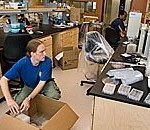Category Science & Technology
Curiosities: Why is the ocean salty?
The saltiness of the sea comes from dissolved minerals, especially sodium, chlorine, sulfur, calcium, magnesium, and potassium, says Galen McKinley, a UW–Madison professor… Read More
Jordan Gerth: Souping up state weather forecasts
Since arriving at UW–Madison from Kenosha in 2005 as a freshman, the atmospheric and oceanic sciences major has taken a lead role in a project that is making campus weather research tools available to frontline forecasters in Wisconsin’s National Weather Service (NWS) regional offices. Read More
UW Badgers, farmers enjoy benefits of whey sports drink
When the University of Wisconsin football Badgers take the field this fall, they will have a secret weapon behind them: Wisconsin's dairy cows. Read More
Beijing seminar helps Wisconsin dairies build a bridge to China
Along the northern and northeastern borders of China, traditionally considered the country's dairy belt, daily life can resemble a scene from a Wisconsin of a bygone era. But Chinese dairy farmers aren't facing the hurdles of modernization alone. To help them meet their lofty goals, they are turning to a state that knows a thing or two about building a dairy industry: Wisconsin. Read More
New ophthalmologist joins School of Veterinary Medicine
Elizabeth Adkins, a board-certified veterinary ophthalmologist, has joined the staff at the University of Wisconsin–Madison School of Veterinary Medicine, effective Aug. 22. Read More
School of Veterinary Medicine sponsors 24th annual Dog Jog benefit
At 10 a.m. on Sunday, Sept. 16, hundreds of animal lovers and their dogs will run (or walk) the two-mile Dog Jog benefit race, sponsored by the University of Wisconsin–Madison's School of Veterinary Medicine. Read More
At home in the Northwoods
Summer is high season at Kemp Natural Resources Station in Woodruff, Wis, when a series of classes, researchers and visitors stream onto Kemp grounds. For most, Kemp serves as a home base for research projects that require access to woods, water, wildlife or wilderness. This summer, the station is hosting people studying topics ranging from climate change to lakeshore ecology to biodiversity. Read More
Curiosities: Why does the sky turn green before a tornado?
Scott Bachmeier, a research meteorologist at the Cooperative Institute for Meteorological Satellite Studies at UW–Madison, says that particles in the air scatter… Read More
Study finds Viagra increases release of key reproductive hormone
The little blue pill may do more than get the blood pumping. Sildenafil — the generic name for Viagra — also increases release of a reproductive hormone in rats, according to a new study. Read More
New children’s hospital becomes reality for families
When nearly 9,000 visitors walked through the new American Family Children's Hospital during its open house in late July, children's hospital Vice President David Berry said he heard two main reactions from patients and families who had offered advice on what the new hospital should include. Read More
Technician cares for Kemp Station
It's an unseasonably hot June day in northern Wisconsin and the sun is blazing, but the solitary figure working on the roof either doesn't mind or is toughing it out. The demanding manual labor, set against a backdrop of the scenic North Woods, makes a typical workday for Gary Kellner, craftsworker and natural resources and maintenance technician at the Kemp Natural Resources Station in Woodruff, Wis. Read More
Engineering experts available on flooding issues
Aug. 20, 2007 TO: Reporters, assignment editors FROM: Renee Meiller, (608) 262-2481, meiller@engr.wisc.edu RE: ENGINEERING EXPERTS AVAILABLE ON FLOODING ISSUES… Read More
UW-Madison among Hartwell Foundation’s 2007 top ten biomedical research centers
For the second year in a row, the Hartwell Foundation of Memphis, Tenn., has named the University of Wisconsin–Madison as one of its Top Ten Centers of Biomedical Research. Read More
NIH MERIT award advances fetal alcohol research
Susan Smith, a professor of nutritional sciences at the University of Wisconsin–Madison, has received a prestigious MERIT award from the National Institutes of Health, which provides research funding for up to 10 years. Smith is an expert on fetal alcohol exposure, the leading known cause of mental retardation in the world. Read More
Recent sightings: Microbial moves
John Holt, a second-year graduate student in the Microbiology Doctoral Training Program, unpacks supplies in plant pathology professor Jo Handelsman’s new… Read More
Ojibwa youth learn to communicate science through new media
In collaboration with Lac Courte Oreilles Community College, a team from the Department of Life Sciences Communication is spending a week at… Read More
Biochemist Frey honored for career leadership
The American Chemical Society's Division of Biological Chemistry will host a symposium in recognition of a UW–Madison biochemist's career achievements. Read More








